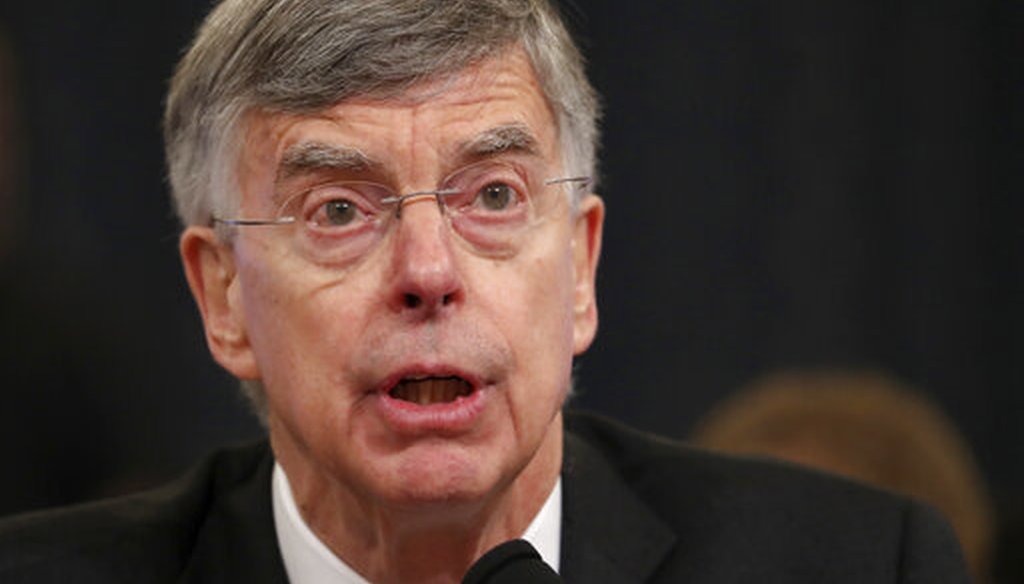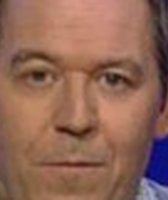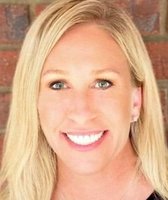Stand up for the facts!
Our only agenda is to publish the truth so you can be an informed participant in democracy.
We need your help.
I would like to contribute

Top U.S. diplomat in Ukraine William Taylor testifies before the House Intelligence Committee on Capitol Hill in Washington, Wednesday, Nov. 13, 2019. (AP)
This story was updated with new details Nov. 14.
The House impeachment inquiry went public Nov. 13 with testimony from Ambassador William Taylor Jr., whose position as the top American diplomat in Ukraine gave him a clear view of the Trump administration’s efforts to get Ukraine to investigate the president’s political rivals.
Alongside senior State Department official George Kent, Taylor testified that President Donald Trump was conditioning "everything" with regard to U.S. policy toward Ukraine on President Volodymyr Zelensky’s willingness to publicly commit to investigations of former Vice President Joe Biden, a potential challenger in the 2020 election.
"President Trump did insist that President Zelensky go to a microphone and say he is opening investigations of Biden and 2016 election interference," Taylor said, citing what Timothy Morrison, the outgoing top Russia expert on the National Security Council, told him.
Sign up for PolitiFact texts
Amb. Bill Taylor: "According to [NSC's Tim] Morrison, Pres. Trump told Ambassador Sondland he was not asking for a quid pro quo. Pres. Trump did insist that Pres. Zelensky go to a microphone and say he is opening investigations of Biden and 2016 election interference." pic.twitter.com/4MVw4nI2Cg
— CBS Evening News (@CBSEveningNews) November 13, 2019
Taylor’s public testimony largely matched what he told Congress behind closed doors, when he described how the Trump administration sought to withhold military aid from Ukraine and deny Zelensky a White House visit unless the country launched these investigations.
In one new revelation, Taylor said a member of his staff overheard a July 26 phone call between Trump and Gordon Sondland, the U.S. ambassador to the European Union, in which the two discussed "the investigations" and Sondland said "the Ukrainians were ready to move forward."
Taylor testified that when his aide asked Sondland what Trump thought of Ukraine, "Sondland responded that President Trump cares more about the investigations of Biden, which (Trump’s personal lawyer Rudy) Giuliani was pressing for."
JUST IN: William Taylor describes being told of a previously undisclosed conversation between Pres. Trump and Gordon Sondland in July, in which Pres. Trump was allegedly heard asking about "the investigations." https://t.co/ZFTpsSGya1 #ImpeachmentHearings pic.twitter.com/S94JMZr8Km
— ABC News Politics (@ABCPolitics) November 13, 2019
Here’s a snapshot of Taylor’s background plus highlights from the testimony he provided in public and behind closed doors.
A career diplomat with a military background
Taylor is the acting U.S. ambassador to Ukraine, a role known as the chargé d’affaires.
A career diplomat and U.S. Army veteran, he has worked in every administration of both parties since 1985, including most recently as the ambassador to Ukraine from 2006 to 2009, according to his State Department biography.
In his October testimony, Taylor said Secretary of State Mike Pompeo asked him in May to take over in Ukraine for former Ambassador Marie Yovanovitch, who Trump had abruptly recalled. Taylor said it "was not an easy decision" because Yovanovitch "had been treated poorly" and he "feared that those problems were still present."
[Did you know, now through Dec. 31, any new donation to PolitiFact will be tripled? For a nonprofit like us, this is a big deal and will help us deliver the kind of important fact-checking you’ve come to expect, every day. Give today and triple the impact of your donation.]
Highlights from his public testimony
In addition to rehashing details from his closed-door deposition and describing the phone call his staffer had overheard, Taylor fielded questions from lawyers and members of both parties.
He swatted down the notion that he was there to take down Trump, telling Rep. Eric Swalwell, D-Calif., that he was not a "Never Trumper," as the president has falsely claimed. He repeatedly asserted that he was there to provide key facts but not to take one side or the other.
Taylor said one harm of withholding aid from Ukraine was that it could have sent a signal to Russia that the United States had drawn down its support for Ukraine. He said conditioning foreign aid for political purposes was not normal and not something he had seen before.
Counsel: "Have you ever seen another example of foreign aid conditioned on the personal or political interests of the president of the United States?"
— ABC News Politics (@ABCPolitics) November 13, 2019
William Taylor, top U.S. diplomat in Ukraine: "I have not." https://t.co/U0mYKRJsjy pic.twitter.com/dWUkZGyThK
Taylor said that Zelensky and his administration believed it would be unwise to play a role in U.S. elections but still planned to announce the investigations that Trump wanted on CNN. He said Sondland told him Trump wanted Zelensky in a "public box."
"President Trump through Ambassador Sondland was asking for President Zelensky to very publicly commit to these investigations," Taylor said. "That it was not sufficient to do this in private, that this needed to be a very public statement."
Taylor also testified that he thought Trump believed Ukraine owed the investigations to him to make up for unsubstantiated allegations of election meddling meant to harm him in 2016.
"He had a feeling of having been wronged by the Ukrainians, and so this was something that he thought they owed him to fix that wrong," he said.
Highlights from his texts
House Democrats had previously released two batches of text messages showing Taylor’s early concerns about Trump’s actions on Ukraine and Giuliani’s activities.
The first selection of texts revealed that on Sept. 1, while talking about the administration’s handling of aid to Ukraine, Taylor asked, "Are we now saying that security assistance and WH meeting are conditioned on investigations?" In response, Sondland told Taylor to call him.
That conversation continued on Sept. 9, when Taylor said, "As I said on the phone, I think it’s crazy to withhold security assistance for help with a political campaign."
"Bill, I believe you are incorrect about President Trump’s intentions," Sondland replied. "The President has been crystal clear no quid pro quo’s of any kind."
The second set of texts released Nov. 5 showed Taylor expressing reservations about accepting the Ukraine ambassadorship because of "the Giuliani-Biden issue."
Highlights from his private testimony
House Democrats released a transcript and key excerpts from Taylor's Oct. 22 deposition a week before his public testimony.
In his opening remarks, Taylor testified that he believed the Trump administration had conditioned congressionally approved military aid and a White House meeting for Zelensky on Ukraine’s willingness to investigate Biden and the Democratic National Committee.
He said Sondland told him "everything" was "dependent on a public announcement of investigations from Zelensky," and that Zelensky planned to make such an announcement on CNN.
In the closed-door interview, Taylor said it was his "clear understanding" that the aid would not be released unless Zelensky announced these investigations, and he said Giuliani was the likely mastermind behind that arrangement. Here are some key portions of the deposition:
• Page 66: "Kurt (Volker) suggested to President Zelensky that President Trump would like to hear about the investigations."
• Page 102: "What the embassy tries to do, as a general rule, is stay out of either our domestic or Ukraine internal politics. So we have not we have tried to avoid dealing certainly with Mr. Giuliani and the kind of efforts that he was interested in."
• Page 136: "If the United States were to ask Ukraine to investigate an apparent violation of Ukrainian law, that would be improper."
• Page 164: "When Ambassador Sondland raised investigations in the (July 10) meeting (with a top Ukrainian official), that triggered Ambassador (John) Bolton's antenna, political antenna, and he said, ‘We don't do politics here.’"
• Page 190: "That was my clear understanding, security assistance money would not come until the President committed to pursue the investigation."
• Page 260: "I think the origin of the idea to get President Zelensky to say out loud he's going to investigate Burisma and 2016 election, I think the originator, the person who came up with that was Mr. Giuliani."
• Page 285: "There was some discomfort within the State Department with Ambassador Sondland’s role in Ukraine. Of course, Ukraine is not in the E.U."
Our Sources
C-Span, "Impeachment Hearing with William Taylor and George Kent," Nov. 13, 2019
The Washington Post, Copy of opening statement of Ambassador William B. Taylor to the House of Representatives, Oct. 22, 2019
House Intelligence Committee, Transcript of deposition of Ambassador William B. Taylor, Oct. 22, 2019
House Intelligence Committee, Text messages provided during deposition of former U.S. special envoy Kurt Volker, Oct. 3, 2019
U.S. Embassy in Ukraine, "Chargé d’Affaires, a.i. William B. Taylor," accessed Nov. 12, 2019
Axios, "Trump impeachment hearing: Highlights from Bill Taylor and George Kent's testimony," Nov. 13, 2019
The New York Times, "Key Moments From the First Public Impeachment Hearing," Nov. 13, 2019
ABC Politics on Twitter, Nov. 13, 2019
CBS Evening News on Twitter, Nov. 13, 2019
The Washington Post, "Who is Bill Taylor, and why does his public testimony matter in the impeachment inquiry?" Nov. 12, 2019
The New York Times, "Key Excerpts From William Taylor’s Testimony in the Impeachment Inquiry," Nov. 6, 2019
The New York Times, "William Taylor, ‘Model’ Diplomat, Is at Center of Impeachment Inquiry," Oct. 22, 2019
PolitiFact, "Read: Text messages between US diplomats about Ukraine aid, Trump phone call," Oct. 4, 2019
PolitiFact, "Timeline: The Trump impeachment inquiry," Oct. 3, 2019






























